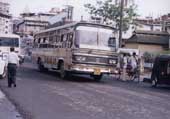 |
Monideepa Choudhuri profiles one of the all-time greats of Assamese literature
1942 — an eventful year in Indian history. A year also when a young 15-year-old’s dream was born from behind the bars of a prison cell in Assam. A dream so beautiful and vivid that even after six decades, the then 15-year-old, now in his 75th year, remembers it as one that has endured “even reality”.
For Chandra Prasad Saikia, winner of the prestigious Assam Valley Literary Award, 2002, the dream — of a free, peaceful and tranquil India — has not been fulfilled. But it has not been lost in the vicissitudes of time either. “I am sanguine that India will one day become the country of that dream,” he professes.
Infused with such profound patriotism, it is no surprise to find almost every creative work of this literary giant permeated by a love for the land. From his first novel, Edin, written when he was still a post-graduate student of English literature in Calcutta University in 1951, to his in-print Imaginary Conversations with Rabindranath — it is nationalism that is all-pervading.
Joining the freedom movement in response to Mahatma Gandhi’s “Quit India” call and strident cries of “vande mataram” was the “biggest event” in Saikia’s life. “I was imprisoned twice and severely beaten up, but the passion did not fade,” he remembers. Out of prison, Saikia appeared for the matriculation examination as a private candidate and later graduated from Cotton College.
Born on July 8, 1927 at Amguri in Sivasagar district, Saikia’s persona exudes a spirited, infectious dynamism — quite impervious to age. But then, Saikia is not just any other septuagenarian. He is one of Assam’s most eminent litterateurs and an outstanding journalist, credited with being the only Assamese, till date, to have edited seven newspapers and literary journals. Apart from his stints in other newspapers and journals, he is the founder-editor of Asom Batori, Asomiya, Prakash, Natun Dainik and Gariyoshi. He still edits Gariyoshi, a literary magazine that has been thrice conferred the famed all-India Katha award.
“I am often asked how I reconcile journalism and literature, considered at variance with each other. And I always say that journalism can be elevated to the level of literature, though not vice-versa,” avers Saikia. The litterateur cites an instance — when more than a decade ago the wife of Ulfa-abducted-and-murdered Russian engineer Sergei Gritchenko came to Assam in search of her husband. “It made news and was stated so. However, as editor of Natun Dainik then, I also wrote that she reminded me of several hundred women who were still waiting for their husbands, pleading to the world to return their vermilion. It is this touch of humanity I think that elevates journalism,” he says.
A former president of Asam Sahitya Sabha, Saikia’s most famous novel is Maharathi — based on the life of Karna, the illegitimate stepbrother of the Pandavas in the epic Mahabharat — for which he was bestowed the Sahitya Akademi award in 1995. The novel is also a personal favourite since he found in the epic character his own alter ego. “Karna always stayed out of trouble’s way; but at the same time never shied away when faced with it. I do likewise,” he says. And one can sense this innate and true courage in Saikia’s straight frame and dignified bearing even as he bows down to pen his gems in the well-stocked library of his hilltop home overlooking the mighty Brahmaputra — quite alone since the death of his wife, Prabina Das, in 1999.
“Her death is the most tragic event of my life. She, too, was a writer of repute and a constant source of inspiration for me,” says Saikia, with a faraway look in his eyes.
Saikia, who joined the Assam Publication Board as secretary in 1967, will be best remembered for starting the Guwahati book fair in 1984. During his 19-year tenure, the board published a number of exceptional books in the Assamese language — Arunadoi, Hastividyarnava, Geeta Govinda, Jyotiprasad Rachanavali, Kautilyar Arthashastra, Complete Works of Anunduram Barooah and many others. “I believe in literature and its ability to change mankind,” Saikia says.
Chandra Prasad Saikia has applied his skills to pour out his soul and to create an “emotional chord with the people, to make them happy. For does not the word sahit, the genesis of sahitya, mean happiness?” he asks.
Imbued with the spirit of Vaishnavism, the legacy of a religious family, Saikia has written about man, the common people. His published repertoire includes short stories, novels, travelogues and collection of articles. Ture Mure Alokore Jatra, his novel based on the glorious life of Jyotiprasad Agarwalla, was awarded the Publications Board prize in 2000.
Saikia’s reputation as one of Assam’s literary greats rests not on the numerous awards that he has been honoured with but on his creativity and intellectual verve. “A writer can never put down his pen. Once he does that he is finished. He can always give better than his best,” he professes.
“When I found my dream shattering against the rocks of reality, I was disillusioned and this became pivotal in my writings. However, there was a glimmer of hope, which evinces in between the lines,” he adds.
So, to this day, Saikia’s pen flows. His soul remains kindled by the power of the word, enraptured by the innate beauty of humankind. “I have deep faith in the power of the printed word and man. Both are indestructible and can rise above the distresses of time,” he observes.
Here one feels impelled to ask the one last question that Saikia himself had asked many masters of literature during interviews — if you were to be exiled to an island, which are the books that you would take with you? He answers promptly — Lakshminath Bezbaruah’s Complete Works, Jyotiprasad’s dramas, songs and articles, Shankardev and Madhadev’s works and Leo Tolstoy’s War and Peace. “These works encompass whatever concerns humanity,” he concludes.










